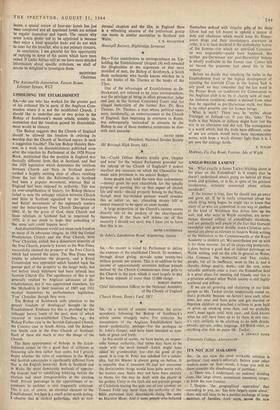SIR,—in a month of solemn memories, the corre- spondence following
the Bishop of Southwark's article seems strangely naive. For centuries the mausoleums of the Anglican Establishment have stood—pathetically, perhaps—for. the prologue to St. John's Gospel, and have been intended as sym-
bols of grace and truth. .
In this world of reality, we have learnt, on respon- sible human authority, that terms may have to be made with the devil himself—Lenin might' have added his grandmother, too—for the good of .the cause. It is true St. Peter was rebuked for a 'similar idea, but his Master is always going on before. It is arguable that if Innocent Ill had not overcome the deviationists things would have gone worse with the human race. Stalin may 'not have been entirely to blame for the way he dealt with the plants' in his garden. Unity in the faith did not prevent groups of Christians tearing the guts out of one another on Towton Field any more than the. authority of the Bible prevented their descendants doing the. same on Marston Moor. And if some people who.. believed
themselves endued with singular gifts of the Holy Ghost had not felt bound to uphold a system of duty and obedience which would keep the Pomer- anian dregs and their counterparts elsewhere in order, it is at least doubtful if the unthinkable horror of the Somme—for which no anti-God Commun- ist was responsible—could have happened. But neither pre-Darwinian nor post-Darwinian history is wholly creditable to the human race. Camus left on record the gruesome fact about life in this century.
Before we decide that smashing the bulbs in the Establishment train or the logical development of rejecting 'the fourfold Cross in the Union Jack is any good, we may remember that the last word in the Prayer Book on conditions for Communion in the. Anglican club is to 'be in charity with all men.' An inclusive condition, which is derived from what may be regarded as pre-Darwinian myth, but there is no other possible aim for human beings.
What is myth? There may be 'myths' about Trafalgar or Jutland—or, if you like, 'tales.' The truth is that Nelson or Jellicoe might have lost the war in an afternoon and did not. The consequence is a world which, had the truth been different, some of use are certain would have been incomparably worse, with hope a much dimmer light than it is. I am sure the analogy holds.
S. TETLEY


































 Previous page
Previous page